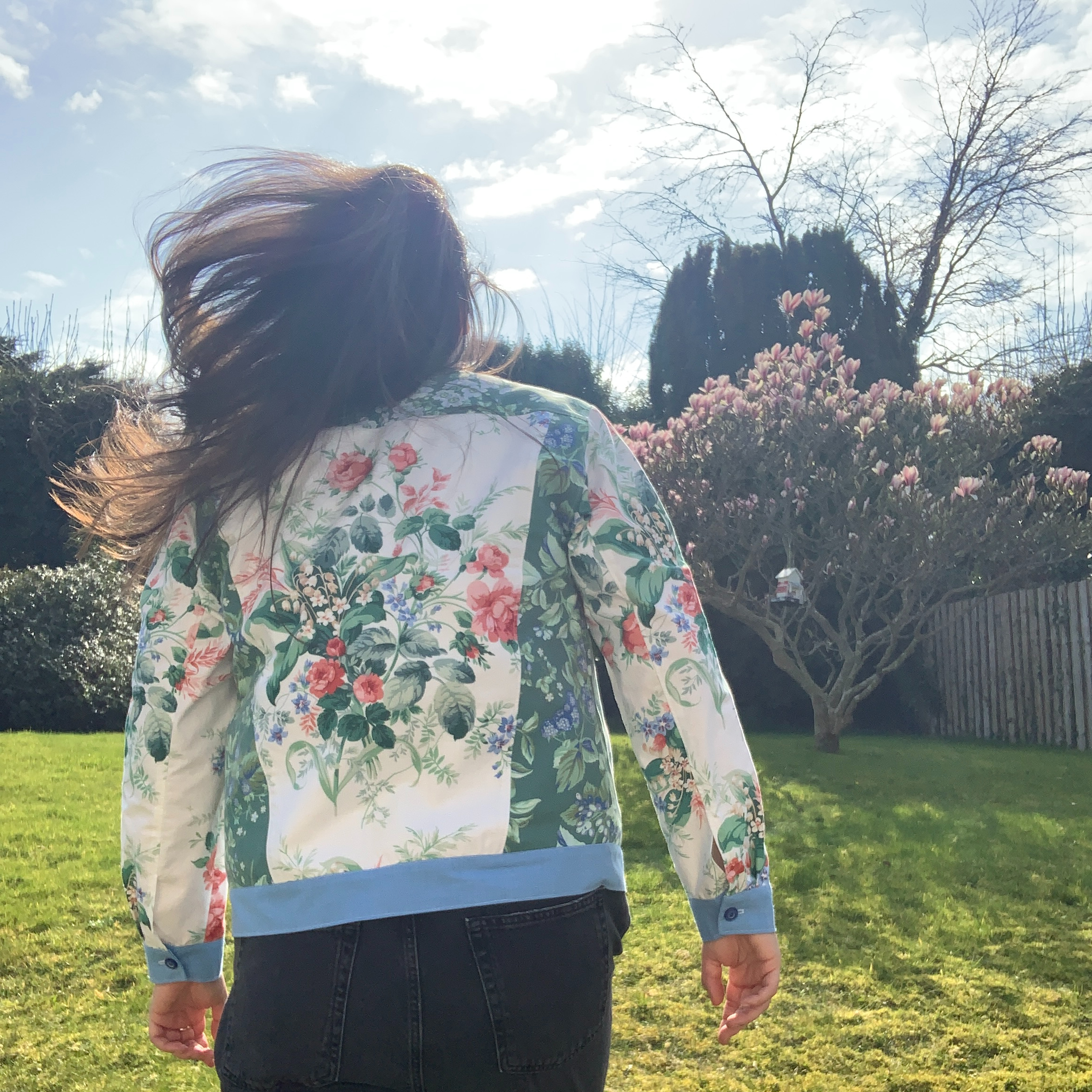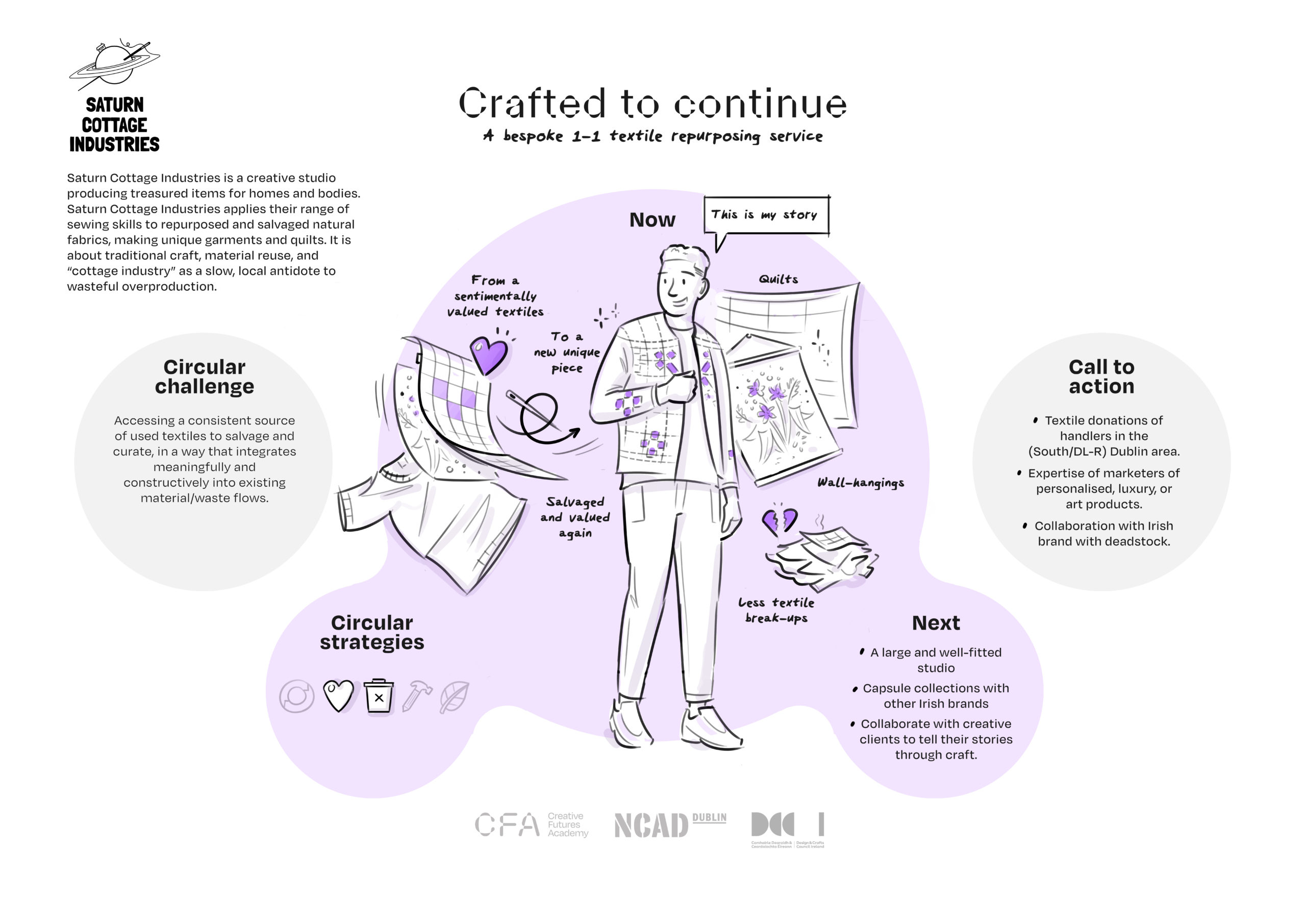Saturn Cottage Industries
Saturn Cottage Industries is a creative studio producing treasured items for homes and bodies. Saturn Cottage Industries applies their range of sewing skills to repurposed and salvaged natural fabrics, making unique garments and quilts. It is about traditional craft, material reuse, and “cottage industry” as a slow, local antidote to wasteful overproduction.

Crafted to Continue
The circular challenge
After assessing the current state, Saturn Cottage Industries’ identified their main circular challenge as accessing a consistent source of used textiles to salvage and curate, in a way that integrates meaningfully and constructively into existing material/waste flows.
The circular design strategy:
- Design for Emotional Durability
- Design for Minimal Waste
The NOW solution: What circular solution was prototyped and what are the companies short-term circular goals?
Saturn Cottage Industries’ circular concept is entitled ‘Crafted to Continue’, and is a bespoke 1-1 textile repurposing service. Clients submit their sentimentally valued textiles for the creation of a new, unique piece, such as a jacket, quilt, or wall-hanging. This might be a way for cloth from a favourite but worn-out garment to be salvaged and worn again as part of a new Saturn Cottage Industries jacket, or it may be an old inherited textile remade into a set of wall-hangings for each family member.
Saturn Cottage Industries used the prototyping opportunity to build out their commissioning process, and create a social media marketing video that demonstrates the customer journey along this process. Their short-term goals are to share the video on social media and embed it on their company website, and to complete a first run of this new end-to-end process with one customer.
What were the main hurdles and lessons learnt from your prototyping phase?
One of the key hurdles that Saturn Cottage Industries encountered whilst prototyping, was in combining two circular design principles; design for minimal waste and design for emotional durability. Both strategies were important to them, therefore they attempted to integrate both strategies by sourcing their input waste materials from the very customers seeking unique pieces – thereby reducing waste, whilst simultaneously stimulating an emotional connection between their client and the repurposed garment. However, this combined approach has its challenges. Since the client is now the supplier, they have less control over the material input. Clients might submit synthetic or overly damaged fabrics, which can be harder to work with or compromise the integrity of a new piece. In addition, while commissioned work creates a wanted, emotionally durable output, it requires greater intensity of communication and logistics needed with each customer, which is challenging to facilitate online/remotely.
To address these challenges that emerged during the prototyping phase, I met with a potential client to have a wide ranging and in-depth discussion of their sentimental textiles and the memories and people associated with them. The meeting was insightful in terms of better understanding the client’s values and wishes for their textiles, and a potential process moving forward.
The NEXT solution: What are your bigger / longer-term circular goals for your brand?
Saturn Cottage Industries’ longer term goal is to have a large and well-fitted studio in which to curate salvaged materials and have a customer-facing space in which to welcome clients and talk through commissions. In addition to 1-1 client commissions, they aim to partner with other Irish brands to make capsule collections from pre-consumer deadstock and offcuts, which would make for specific patchwork aesthetics and colour palettes per collaboration. Furthermore, they also see opportunities to collaborate with creative clients such as artists and performers to help tell their stories through craft – be it through costume or art.
Finally, Saturn Cottage Industry aims to act as a thought leader and knowledge broker, by writing about clothing and craft via regular blogs/newsletters and short publications and developing a manifesto around caring for clothing and their methods of material repurposing.

Projected future impact: What is the expected positive impact - environmental, economic, social - from your longer term circular solution.
Saturn Cottage Industries will remove textiles from the current waste stream by facilitating the active repurposing of sentimentally valuable worn textiles and salvaging other post-consumer textiles before landfill or export. However the main impact will be social, especially in changing hearts and minds when considering the aesthetic and sentimental value of worn or damaged textiles.
They like to visualise being part of or running a textile repurposing material library of sorts, where post-consumer garments are processed into usable cloth and notions, which are filed by fibre/colour/weights.
What questions or uncertainties are you facing right now in terms of your circular development?
- How can I reach customers with the desire to repurpose their precious but unusable textiles?
- How can I efficiently tap into local textile waste streams to salvage and curate (supplementary) supply?
- How can I leverage my craft to foster a wider supply chain of post-consumer textiles in Ireland.
Call to Action:
To move from prototype to pilot, Saturn Cottage Industries is looking for the following supports:
- I need to talk to handlers of textiles donations in the (South/DL-R) Dublin area who want to see some of their excess redirected and resourced locally.
- I need the expertise of marketers of personalised, luxury, or art products.
- I need to be on the radar of Irish fashion companies for collaborations or resourcing when they find themselves with deadstock fabric/garments.


